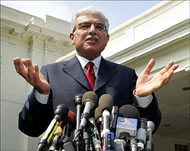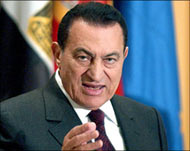Egypt opposition prepares poll protest
Protesters have prepared for another round of demonstrations to support judges’ demands for election transparency.

In a related development, a top aide to President Hosni Mubarak said international monitors will not be allowed to observe September’s presidential poll.
Egypt’s judicial assembly agreed in May to boycott the presidential election on 7 September unless laws were reformed to ensure their independence and give them full control over the election process.
US President George Bush personally prodded Mubarak in June to make Egypt’s first presidential election genuinely democratic and open to outside observers.
Monitors rejected
But Egypt’s government opposes the presence of outside monitors, claiming the people would object because of the country’s sensitivity to its colonial past.
 |
|
PM Ahmed Nazief said Egypt has |
Osama el-Baz, a long-time adviser to Mubarak, said accepting international monitors would infringe upon Egypt’s sovereignty.
“Our neutrality is not under doubt,” el-Baz said in comments published on Saturday. “Egypt is not under a mandate to accept international monitors to supervise elections,” he said.
Contrary to the judges’ position, el-Baz claims the election process will have “complete transparency and complete judicial supervision on elections beside the presence of international media which will cover the elections”.
Electoral fraud
During the country’s past parliamentary elections, judges were tasked with supervising the poll, checking the count and candidate lists and monitoring polling stations.
 |
|
Opposition groups say Mubarak |
But critics say their presence is no protection against voter fraud because Interior Ministry officials, not the judiciary, transports the ballot boxes afterwards. Past elections have been plagued with claims of vote-rigging and intimidation at the polls.
After their assembly in May, the judges said they would make their final decision on whether to boycott or not within the first week of September.
The assembly decision is not binding for judges, and it was not yet clear whether all of Egypt’s judges would join the boycott.
Boycott
While Washington has pressed Egypt to make the 7 September poll free and fair, major opposition groups here have decided to boycott because they believe 77-year-old
Mubarak, who has been in power since 1981, enjoys unfair advantages.
The vote will be the country’s first presidential election with more than one presidential candidate.
Egyptian Prime Minister Ahmed Nazief said in July that the world was welcome to watch the polls but did not promise full access.
“We have an independent election commission that has been already elected and will be running the elections and supervising it. But, of course, the election will be monitored by the international media and it will be watched also by NGOs, people working in the country,” Nazief told CNN’s Late Edition programme.